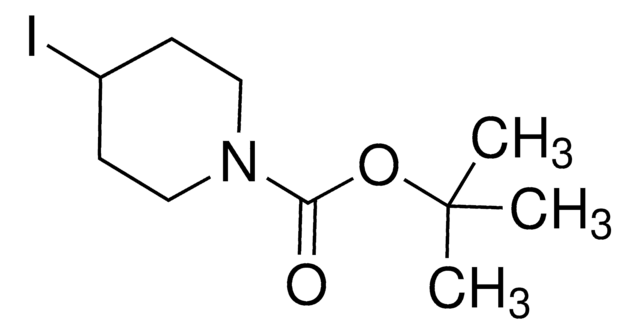932612
NanoFabTx™ Biotin Lipid Mix
for synthesis of biotin-functionalized liposomes for small molecule delivery
Synonym(s):
Biotin-PEG-DSPE, Cholesterol, HSPC, PEG-DSPE
Sign Into View Organizational & Contract Pricing
All Photos(1)
About This Item
UNSPSC Code:
12352211
NACRES:
NA.25
Recommended Products
Quality Level
storage temp.
−20°C
Application
NanoFabTx™ Biotin Lipid Mix is a ready-to-use nanoformulation lipid mixture for the synthesis of biotin-functionalized liposomes. This lipid mix enables users to encapsulate a wide variety of small molecules for targeting and immunotherapy applications without the need for lengthy trial-and-error optimization.
This product includes a curated lyophilized lipid mixture containing rationally selected lipids in precise ratios that have been optimized to achieve a desired size range of liposomes. Step-by-step protocols for the synthesis of liposomes surface-functionalized with biotin groups using extrusion and microfluidics are also included. The synthesized biotin-functionalized liposomes enable 1) selectively targeting cells which overexpress avidin-receptors (i.e. HeLa cells) and 2) the conjugation of avidin-tagged antibodies or proteins (i.e. Streptavidin) to the liposomes surface for immunotherapy applications and multi-targeting or multi-type cargo delivery.
This product includes a curated lyophilized lipid mixture containing rationally selected lipids in precise ratios that have been optimized to achieve a desired size range of liposomes. Step-by-step protocols for the synthesis of liposomes surface-functionalized with biotin groups using extrusion and microfluidics are also included. The synthesized biotin-functionalized liposomes enable 1) selectively targeting cells which overexpress avidin-receptors (i.e. HeLa cells) and 2) the conjugation of avidin-tagged antibodies or proteins (i.e. Streptavidin) to the liposomes surface for immunotherapy applications and multi-targeting or multi-type cargo delivery.
Features and Benefits
- A ready-to-use nanoformulation lipid blend for the synthesis of biotin-functionalized liposomes
- Step-by-step extrusion and microfluidics protocols for liposome synthesis developed and tested by our formulation scientists
- Flexible synthesis methods to create uniform and reproducible liposomes
- Protocols and lipid blend optimized to make liposomes around 100 nm diameter with low polydispersity
- Lipid mix optimized for avidin-tagged protein or antibody conjugation and small molecule encapsulation
- A lipid film hydration and extrusion protocol
- A microfluidics protocol using commercial platforms or syringe pumps
For more information, please refer to the protocol under the Protocol section of this page.
Legal Information
NANOFABTX is a trademark of Sigma-Aldrich Co. LLC
Storage Class Code
11 - Combustible Solids
WGK
WGK 3
Choose from one of the most recent versions:
Certificates of Analysis (COA)
Lot/Batch Number
Sorry, we don't have COAs for this product available online at this time.
If you need assistance, please contact Customer Support.
Already Own This Product?
Find documentation for the products that you have recently purchased in the Document Library.
Eliana B Souto et al.
European journal of pharmaceutical sciences : official journal of the European Federation for Pharmaceutical Sciences, 128, 27-35 (2018-11-26)
CAB51, a compact antibody against human epithelial growth receptor 2 (HER2, ErbB2), has been linked to cationic Solid Lipid Nanoparticles (SLN) via streptavidin-biotin interaction and their targeting potential evaluated against breast cancer cells. The amount of streptavidin and biotinylated antibody
Biotin-targeted mixed liposomes: A smart strategy for selective release of a photosensitizer agent in cancer cells
de Freitas CF, et al.
Materials Science and Engineering, C, 104, 109923-109923 (2019)
Nina Pedersen et al.
European journal of pharmaceutics and biopharmaceutics : official journal of Arbeitsgemeinschaft fur Pharmazeutische Verfahrenstechnik e.V, 62(2), 155-162 (2005-11-18)
Cationic solid lipid nanoparticles (SLN) have recently been suggested for non-viral gene delivery, as these particles consist of well tolerated substances, can bind DNA directly via electrostatic interactions and mediate gene transfer in vitro. We here report the development of
Anticancer drug-loaded mesenchymal stem cells for targeted cancer therapy
Takayama Y, et al.
Journal of Controlled Release : Official Journal of the Controlled Release Society, 329, 1090?1101-1090?1101 (2021)
Ana Rute Neves et al.
Nanotechnology, 26(49), 495103-495103 (2015-11-18)
Nanotechnology can be an important tool to improve the permeability of some drugs for the blood-brain barrier. In this work we created a new system to enter the brain by functionalizing solid lipid nanoparticles with apolipoprotein E, aiming to enhance
Our team of scientists has experience in all areas of research including Life Science, Material Science, Chemical Synthesis, Chromatography, Analytical and many others.
Contact Technical Service







